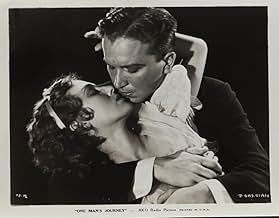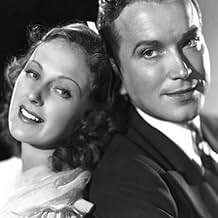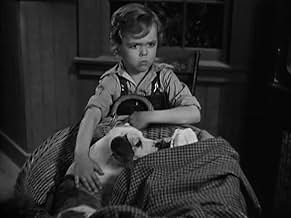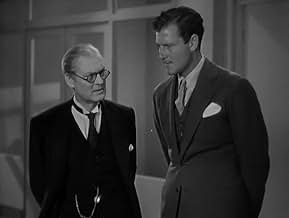AVALIAÇÃO DA IMDb
6,7/10
555
SUA AVALIAÇÃO
Adicionar um enredo no seu idiomaWidower Dr. Watt moves to a small town, raising son Jimmy and abandoned Letty. Despite aspirations for research, epidemic, family needs hinder his goals. Years later, he realizes his life wa... Ler tudoWidower Dr. Watt moves to a small town, raising son Jimmy and abandoned Letty. Despite aspirations for research, epidemic, family needs hinder his goals. Years later, he realizes his life wasn't a failure.Widower Dr. Watt moves to a small town, raising son Jimmy and abandoned Letty. Despite aspirations for research, epidemic, family needs hinder his goals. Years later, he realizes his life wasn't a failure.
- Direção
- Roteiristas
- Artistas
- Prêmios
- 3 vitórias no total
Samuel S. Hinds
- Dr. Babcock
- (as Sam Hinds)
Frank Ball
- Townsman
- (não creditado)
Dorothy Gray
- Letty's Daughter
- (não creditado)
John Ince
- Dr. James Carson
- (não creditado)
Lloyd Ingraham
- Townsman at Farewell Meeting
- (não creditado)
Dave O'Brien
- Dance Extra
- (não creditado)
Avaliações em destaque
This is one of the "lost but found" films shown on TCM on 4/4/07. Apparently this and two other films shown that night were held out of public release due to litigation concerning royalties and now the powers that be at Turner Classic Movies have taken care of the licensing issues. Of the three films shown that night, none of them were great treasures but all three were excellent--very solid examples of the type of films RKO made during the era. Normally, when you think of RKO in 1933, you think KING KONG or Astaire and Rogers as a team, but there were other good films that might rank just below them in quality and entertainment.
This film is rather reminiscent of several other doctor dramas from the era (such as THE CITADEL and ARROWSMITH) where the doctor's nobility and sacrifice are celebrated. A younger Lionel Barrymore (sporting a dark doo thanks to hair dye) comes to a rural area to set up a medical practice. However, at first, he is unsuccessful and only begins to get patients when he agrees to use the barter system. Because of this, he is constantly in financial straits, but because he is so noble and decent, he doesn't give up and is eventually accepted and loved by the community. While all this could have been VERY syrupy, thanks to good writing and a terrific performance by Barrymore it is not.
There is certainly a lot more to the movie than this--including an excellent (as usual) performance by May Robson and an early performance by Joel McCrea. See this film and see a "small" film that really packs an excellent punch.
This film is rather reminiscent of several other doctor dramas from the era (such as THE CITADEL and ARROWSMITH) where the doctor's nobility and sacrifice are celebrated. A younger Lionel Barrymore (sporting a dark doo thanks to hair dye) comes to a rural area to set up a medical practice. However, at first, he is unsuccessful and only begins to get patients when he agrees to use the barter system. Because of this, he is constantly in financial straits, but because he is so noble and decent, he doesn't give up and is eventually accepted and loved by the community. While all this could have been VERY syrupy, thanks to good writing and a terrific performance by Barrymore it is not.
There is certainly a lot more to the movie than this--including an excellent (as usual) performance by May Robson and an early performance by Joel McCrea. See this film and see a "small" film that really packs an excellent punch.
Lionel Barrymore gave a memorably restrained performance in this 1933 film. It stands as a precursor to films such as 1959's "The Last Angry Man" with Paul Muni.
The setting takes place in rural America circa 1910. Having lost his wife in childbirth, Barrymore returns to his roots only to lose his first patient there as well to child-birth. The embittered husband is ready to take the baby to the poor house but Barrymore takes the little baby girl in along with his young son. Just on the girl's 4th birthday, the father returns and seems much reformed. Barrymore gives the girl, Letty, back to him. Letty maintains a father-like relationship with Barrymore through the years.
As the years pass, Barrymore wins the hearts of the town with his dedication and free services for the impoverished.
He lets opportunities pass which could have gotten him out of the town. Some how we know this from the George Bailey effect of 1946's "It's A Wonderful Life." Like George Bailey, this doctor is going nowhere.
May Robson costars as a beloved housekeeper who enters the Barrymore home at precisely the right time.
This is a nicely done heartwarming story of rural America from 1910 through 1933.
The setting takes place in rural America circa 1910. Having lost his wife in childbirth, Barrymore returns to his roots only to lose his first patient there as well to child-birth. The embittered husband is ready to take the baby to the poor house but Barrymore takes the little baby girl in along with his young son. Just on the girl's 4th birthday, the father returns and seems much reformed. Barrymore gives the girl, Letty, back to him. Letty maintains a father-like relationship with Barrymore through the years.
As the years pass, Barrymore wins the hearts of the town with his dedication and free services for the impoverished.
He lets opportunities pass which could have gotten him out of the town. Some how we know this from the George Bailey effect of 1946's "It's A Wonderful Life." Like George Bailey, this doctor is going nowhere.
May Robson costars as a beloved housekeeper who enters the Barrymore home at precisely the right time.
This is a nicely done heartwarming story of rural America from 1910 through 1933.
Lionel Barrymore played a country Doctor who healed bodies as well as hearts. He helps Dorothy Jordan and James Bush and than later, Joe McCrea ( as his son) and Frances Dee. He played a character who was good hearted & hard working & was often only paid with potatoes as recompense. Sentimental, up-lifting, self-sacrifice & nobility all figure into the picture. It was remade in 1938 as A Man to Remember with Edward Ellis in the Barrymore role. The roles of Dee & Bush were dropped & in this case the son ( lee Bowman) falls in love with Anne Shirley--as the Jordan character. Acting was good all around. Jordan is pretty much forgotten today. She made several films in the early '30's and then married Merian C.Cooper. McCrea & Dee married shortly after making this picture. James Bush was in many films up to the early '50's, mostly in small, uncredited roles.
Lionel Barrymore got to play a nice guy for a change in this sentimental drama. In an unusually subdued performance, Barrymore plays a widowed family doctor starting a new life with his young son in a small town. The locals are leery of the outsider and the few cases that come his way are paid for with potatoes and eggs. When one of his patients dies in childbirth, the angry husband wants nothing to do with his infant daughter, so the kind doctor takes her in. Soon feisty May Robson comes aboard as a volunteer housekeeper. The story fast-forwards twenty years to find the son (Joel McCrea) a hotshot Type-A doctor with little time for his beautiful and long-suffering fiancée Frances Dee. At the end of course, everyone realizes how fortunate they really are. It was nice to see the luminescent Miss Dee on the big screen only two days before she died at age 94. Screened at Cinefest in Syracuse New York, March 2004.
One Man's Journey is the sentimental filmed tale of the life of a country doctor as played by Lionel Barrymore. It's a nice, but very dated story, doctors like Barrymore are sadly a thing of the past.
Barrymore arrives back in his hometown, a widower with a small son who later grows up to be Joel McCrea and follows in his father's footsteps as a physician. In fact he starts off on the wrong foot by losing the mother during a difficult pregnancy. The daughter from that pregnancy grows up to be Dorothy Jordan and she's more Barrymore's child than she is of David Landau.
May Robson's in this film also as Barrymore's feisty housekeeper who brings an aged feminine touch to his household as well as a streak of practicality. She's probably the best one in the film.
One Man's Journey bears a lot of resemblance to Goodbye Mr. Chips. Like Chips the schoolmaster in Great Britain, Barrymore's Doctor Eli Watt affects literally hundreds of lives during the course of his time on earth. Like his son Joel McCrea said in a much later picture, Eli Watt enters his house justified.
It's a nice film, terribly dated though and that's not a good thing.
Barrymore arrives back in his hometown, a widower with a small son who later grows up to be Joel McCrea and follows in his father's footsteps as a physician. In fact he starts off on the wrong foot by losing the mother during a difficult pregnancy. The daughter from that pregnancy grows up to be Dorothy Jordan and she's more Barrymore's child than she is of David Landau.
May Robson's in this film also as Barrymore's feisty housekeeper who brings an aged feminine touch to his household as well as a streak of practicality. She's probably the best one in the film.
One Man's Journey bears a lot of resemblance to Goodbye Mr. Chips. Like Chips the schoolmaster in Great Britain, Barrymore's Doctor Eli Watt affects literally hundreds of lives during the course of his time on earth. Like his son Joel McCrea said in a much later picture, Eli Watt enters his house justified.
It's a nice film, terribly dated though and that's not a good thing.
Você sabia?
- CuriosidadesMerian C. Cooper had accused RKO of not paying him all the money contractually due for six RKO films he produced in the 1930s. In 1946, a settlement was reached, giving Cooper complete ownership of the RKO titles: Adorada Inimiga (1933) with Ginger Rogers, Double Harness (1933) with Ann Harding and William Powell, Divina (1933) with Ann Harding and Robert Young, O Drama de um Homem (1933) with Lionel Barrymore, Living on Love (1937) and Um Benemérito (1938).
In 2006, Turner Classic Movies, which had acquired the rights to the six films after extensive legal negotiations, broadcast them on TCM in April 2007, their first full public exhibition in over 70 years. TCM, in association with the Library of Congress and the Brigham Young University Motion Picture Archive, had searched many film archives throughout the world to find copies of the films in order to create new 35mm prints.
- Erros de gravaçãoAs Dr. Watt leaves the McGinnis house, the shadows of the trees fall clearly on the "sky" cyclorama.
- ConexõesFeatured in TCM: Twenty Classic Moments (2014)
- Trilhas sonorasDown By the Old Mill Stream
(1910) (uncredited)
Written by Tell Taylor
In the score during the opening credits and at the end
Principais escolhas
Faça login para avaliar e ver a lista de recomendações personalizadas
Detalhes
- Data de lançamento
- País de origem
- Idioma
- Também conhecido como
- One Man's Journey
- Locações de filme
- Empresa de produção
- Consulte mais créditos da empresa na IMDbPro
- Tempo de duração
- 1 h 12 min(72 min)
- Cor
- Proporção
- 1.37 : 1
Contribua para esta página
Sugerir uma alteração ou adicionar conteúdo ausente








































